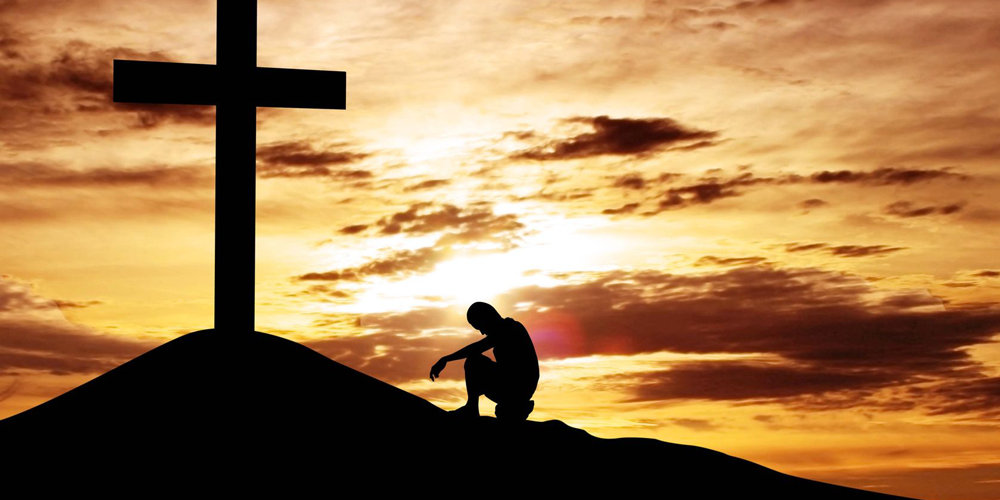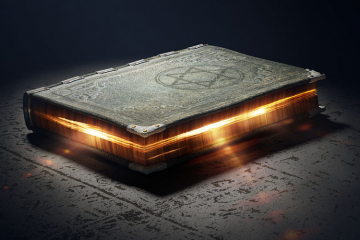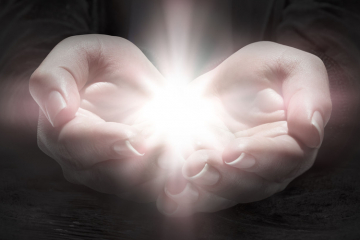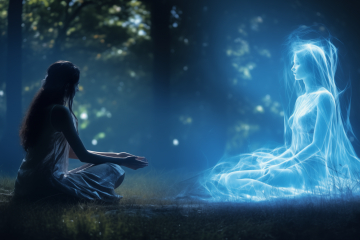We’ve thrown out sin.
It’s gone, along with religious guilt, dogma and other old dusty concepts that clash with our modern sense of freedom. It’s gone because it was a moral label from a by-gone past. Or at least, that’s what we think.
But I’m going to tell you a story that I never expected to tell.
That not only is sin not what they taught us it is, but that it’s a vital part of the spiritual path. Or just the creative path. The one where you become yourself, and create the work you were made for.
Sin is not the old sin of the Catholic Church, or Bible class, or violating the Ten Commandments, or screwing your neighbour’s wife. It’s something real and vital. Something at the very root of a life of wholehearted fullness and authentic success.
Sin is a good thing, an important thing, a powerful thing. And that’s what I never expected to say. So, this article is about sin. And not only sin, but about the greatest sin of our times.
And it begins with shame.
I’m ashamed
I’m ashamed of stealing money from my parents when I was a kid. A friend and I were building an elven army from little lead figures that we painted. And they were really expensive. So we stole money.
I’m ashamed about the way I’ve treated some of the women in my life. I’d promise them my heart, and so they’d open. And then I’d realize I’d compromised my freedom too much, and I’d leave them. And they’d get hurt.
I’m ashamed about the way I’ve manipulate people to get what I wanted. I did that with my first business. When my business partners got in the way, I played a nasty political game to try and get rid of them. They still don’t talk to me.
I’m ashamed about all the messes I’ve made, that I didn’t go back to clear up.
And I’m ashamed of not going after my dreams as hard as I could. I tell people I’m here to do big things. I feel like I am. I wrote recently that I felt I should be famous. Not because I want fame, but because I want to impact the world. I feel I’m here to make a big difference.
And I feel ashamed that I don’t live up to the magnitude of that ambition during my day. I get scared, and play online pool, or read novels, or eat sugar, or smoke pot. Because it feels safer, because it insulates me from the increasing volume of life’s call.
And that is the modern sin. The greatest sin of our times.
That we are not truly listening to what is asked of us.
That we are turning away from the path we know we’re meant to walk.
That we believe we’re unworthy of the great mission that burns inside our hearts.
The original nature of sin
I was not brought up Christian. I was never baptized. I never went to church as a kid. We had the occasional bible reading from Miss Bathmaker at school. I was brought up as an atheist, with a sprinkling of new-age.
I thought religion was a crock of shit, until my 20s when I became interested in the work of spiritual philosopher Ken Wilber. And I got into meditation, and Buddhism, and mysticism, and Rumi. Then over the last couple of years, I’ve been drawn increasingly into the mystical teachings of Christianity. And I’ve written about the guidance I’ve found through my friend Jesus.
Earlier this year I was reading some letters. They were private letters that my mentor Rand had generously shared with me. They were written to him, from his spiritual coach. And in one of them I discovered a discussion about sin. And I was pulled in.
It’s such a cultural-laden word. What do you think of when you read it?
Sin.
Naughty little girl? Stealing. Men fucking men. Abortion. Murder. Worshipping the wrong god?
That’s always what I thought it meant. An old, out of date word that Christians used to shame people, so they got in line. And I think that’s exactly how it’s used a lot of the time. But sin doesn’t originally mean ‘doing bad stuff’. The original meaning is something so much deeper.
To learn why, we need to go way back in time at least 2,500 years to the original Hebrew Bible. This was the book that got turned into the Old Testament (the really old, pre-Jesus bit of the Bible). In this original Hebrew text, there were three words, that when translated into Greek, were translated into a single word, in English – ‘sin’.
But these three original Hebrew words don’t mean ‘bad’. No, what they represent are different degrees of being out of relationship with God.
Not evil. Not wrong.
Out of relationship with reality.
Missing the mark of where you’re meant to be, want to be.
I felt a giant shiver run down my spine when I first read it. And I’ve told the story many times to friends since. And I still get a shiver each time.
Sin is disconnecting from your own truth. Sin is violating the principles we live by, and refusing to come back into relationship with reality.
And a lot of us are doing that. Especially with big things that really matter to us. Like living the purpose we know we came here for. And when you turn away from that truth for long enough, you start to feel something grow in the centre of your being. Something that twists and hurts.
Deep existential shame.
Because you know you’re not doing what you’re supposed to be doing. This is why it starts with shame. But shame is a tricky thing.
The inauthenticity of shame
A couple of years ago I was staying in a friend’s apartment, and was shooting videos of myself talking about some ideas I was excited about. And the same thing kept happening.
I’d be in full flow, excitedly talking, gesticulating, emoting. And then mid-sentence I’d slow down to almost nothing. And my head would drop. And I’d close the laptop lid. And sit there. And pretend it hadn’t happened, and go do something else.
And on the fifth time I actually noticed it.
“What the fuck was that?”
I opened up the laptop again, turned on the video and started spontaneously coaching myself on what had just happened. I even moved position in my chair to play both interviewer and client.
“Wow, so what happened for you there Ewan? That looked intense.”
“Yeah it was. I don’t know. I was just talking, and then my gut got really tight, and I felt hot, and exposed. It was like I was getting pulled down into something.”
I discovered the shame spiral.
I feel ashamed about something. And then I feel ashamed about feeling ashamed. And then ashamed about feeling ashamed about feeling ashamed. Ad infinitum.
And the weight gets ever heavier and my identity ever smaller, as I’m sucked down into the blackness of unworthiness. But this time I’d seen it. And got curious.
What is shame?
I looked it up. It’s an old word. It means literally a “feeling of disgrace”. I was enthralled. Dis-grace. A feeling of not having any grace. And then I clocked it. Shame is not an emotion. It’s an assessment. Something happened, and now you can’t feel your own inherent grace. You’ve lost touch with it. And so you think you don’t have any.
“I’m worthless. I’m such a bad person. I not good for anything. I give up. It’s all fucked.”
Shame is a shitty thing to feel, because, I would argue, it’s not an authentic experience in and of itself. The feeling is real, the somatic weight is real, and it’s pointing to something real.
But the experience of shame is predicated on the belief that you’re inherently bad, and without grace.
And that’s simply not true.
Now, shame is not bad. It’s inevitable. I don’t know anyone who doesn’t feel it. And what it does, is show you where you’re out of alignment with your own truth. It shows you where you’re out of relationship with God.
It shows you where you’re in sin.
Shame is the start of the trail back out of sin, and into deeper relationship with truth.
The invitation toward a deeper truth
The Catholics got it right. Sin is about shame (and guilt). But not in the way they thought. The traditional teaching is that shame is a consequence of sin. Something like this…
You sin, and so you feel shame as a consequence. Which is good. But makes you feel bad. Because a sinner should feel bad. Because sinning is bad. And maybe if you feel shitty enough, you won’t sin again. And you’ll get into heaven.
So, when you sin, we forgive you, punish you, and then you’re saved.
Which is a nice attempt.
But created some damaging results.
Chronic unworthiness. Institutional sexism. Screwing under-age choir boys.
I’m being slightly unfair here. Because these ideas were actually revolutionary and transformed culture as we know it. The problem is that the revolution happened a couple of thousand years ago. And things have moved on rather a long way. So like I said, nice try, shitty results.
And to understand why, we turn to the research of the brilliant writer and researcher Brené Brown. Brené makes a crucial distinction between shame and guilt.
Guilt is “I did something bad”.
Shame is “I am bad.”
Guilt is about behaviour. Shame is about identity.
And people who feel one or the other lead incredibly different lives. Her research is unequivocal in its findings. Large levels of shame in a person are highly correlated with high levels of addiction, depression, aggression, suicide and other really fun stuff. High levels of guilt are inversely correlated with those things.
In other words. Guilt is really good for you. Shame fucks you up.
I think shame is guilt that has no outlet toward transformation. It’s guilt that has rotted and gone bad. Or it’s guilt that has been smashed into a hard shameful truth by some religious hammer.
Shame is an amazingly big assessment to make. Something happens that you don’t feel good about, and you extrapolate out, and make some sweeping statement about the infinite truth of your infinite existence.
I watched porn.
Bad people watch porn.
That means I’m a bad person.
And a bad person is worthless.
I’m worthless.
Period.
You take a black mark and decide to tar your whole human existence with it.
So while shame is in some sense, an inauthentic feeling, its root is not. It’s a beacon, and it’s pointing toward greater relationship with ourselves. And the journey winds through guilt.
The great gift of guilt
Being out of relationship with god, out of alignment with your truth is inevitable. It’s what happens when we live. And guilt is this amazing gift. It’s what we feel when the alignment slides out of whack, when we’re out of integrity with our code of truth. It’s our higher self smacking us on the ass.
“Hey buddy. That doesn’t feel good does it? In fact, it hurts. Change direction.”
It’s like a series of little lights, guiding us down the path of greater truth, greater goodness and greater beauty.
But when we don’t listen to that feeling. When we don’t let it penetrate us, hold us to account and spark our discomfort, then that guilt starts to toxify. It goes stagnant, and it turns into shame.
Shame is toxic. And it stops us from acting. Because if I am bad, then I’m powerless to do anything about it. I’m a victim of my own rotten core. Shame feels final. It’s not, but it feels like it. The gift and the power lies in embracing your sense of guilt.
In part 2 of this article, I’ll go in depth into the basic principles of working with shame and guilt, and how to transform them into deeper truth.
But for now. I want try and summarize the nature of sin.
Here’s the basic recipe
- Sin is what happens when you get out of alignment with your own truth.
So, sin is not smoking pot. Sin is smoking pot if you know you have a lot of important work you want to do, and you ignore your sense of integrity, and get high anyway.
It’s sin, because you violated a deeper truth. Not because you ‘broke a commandment’.
- And when you enter into sin, you feel guilty.
Not because someone said you should, or because bad people smoke pot. But because you know you’ve violated your own integrity. True guilt is yours.
- And if you don’t honor that sense of guilt. And take action, then it will start to rot. And the guilt turns into shame.
Shame is a nasty fucker, who eats up a whole bunch of stuff. But is actually trying to help us by turning up the volume on our suffering.
Because many of us are sinning. And there is one sin that is standing out. Head and shoulders above the rest.
It’s a great sin.
What is being asked of you?
You have a great body of work to express. It’s yours. It’s unique. It’s precious. It’s fragile. It holds untold power. And God is asking you about it.
Only you know. And you do know. Maybe it’s being shouted in your face. Maybe it’s that insistent whisper that you know is always there, and that you dampen with busyness, or television, or bravado.
What is being asked of you?
If you’re truly honest with yourself, you’ll likely find a place where you’re not listening. We’re all doing it. It’s the greatest sin of our times.
There has never been a time like this. When the barriers to sharing our work with the entire world are gone. Completely. The internet and the information age have shattered the barricades of tradition and hierarchy.
The only blocks now are yours.
It’s your fear. Your terror of truly showing yourself. Of not wanting to fail. Of not knowing how to do it right. Of not wanting to be rejected by everyone. It’s my fear too.
And when we don’t listen, we suffer. Because however much we practice numbing out, we know deep down that we’re more powerful than we can bare to imagine.
And I know you’re ashamed.
And I am too.
And this is the invitation.
For both of us.
To listen to what is asked.
And come face to face.
With that which calls us,
In every moment.
This article is the first part in a 2 part-series. In part 2 – The Lost Technology of Spiritual Transformation – I explore an old and powerful practice that people have used for centuries to work with shame, and transmute it into greater depth and greater truth.





Ewan, Thank you.
This is f*&king awesome writing and insight.
It is exactly what I needed to hear.
Your honesty is so damn powerful.
You are so welcome James. Sometimes I wonder why I put myself through the uncertainty of sharing my inner most thoughts.
And then I read what you wrote, and I remembered why.
Thanks you fellow traveller.
I love this Ewan. Thank you.
🙂 Xxx
Awesome insights Ewan! Please, keep ’em coming!
I can’t seem to stop them.
Thank you for writing this Ewan. Very close to home right now and the kind of raw honesty I needed to hear. I absolutely agree that this is the greatest sin of our time and I am so grateful that there are people out there like you willing to say it. Looking forward to Part 2.
This was all written for myself just as much as anyone else, so I’m in there with you Natalie!
Wow man, get out of my head & my life!! I first ask myself how you could possibly nail what’s going on for me so well & then realise that I already know the answer. I’m not the only one in the world who feels like this & never have been. We only think we are & the more you/we all share these feelings, the less isolated & disconnected we will feel. Thank you so much for doing so & I can’t wait for part 2!! 🙂
You are so welcome Jodes! You’re not the only one. I’m one too. And so many other people I know.
And…it doesn’t stop there. Part 2 is really about how to work with this. Half written, but it’s already changing the way I’m thinking about it all.